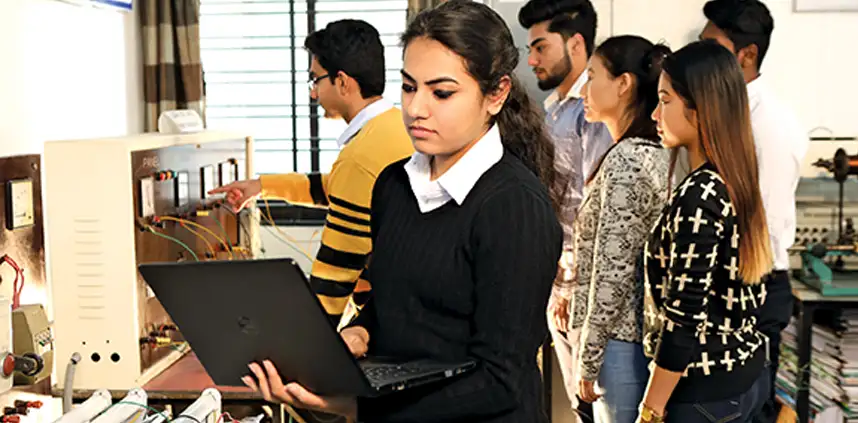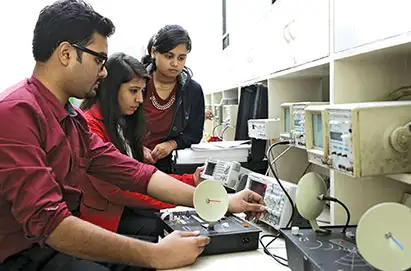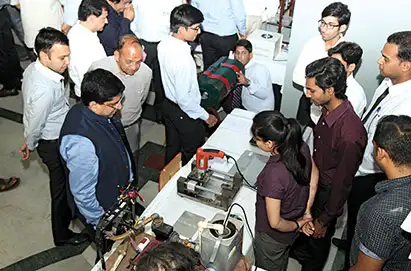Internship & Placement Opportunities for B.Tech Electronics and Communication Engineering (Lateral Entry) Students
Electronics and Communication Engineering (ECE) graduates have a wide array of career opportunities across various industries due to the following reasons:
- As technology continues to evolve, ECE graduates have the chance to work on cutting-edge projects, contributing to advancements in areas such as wireless communication, IoT, artificial intelligence, and more.
- Electronics are an integral part of our daily lives, from smartphones and laptops to smart appliances and medical devices. This widespread use ensures a constant demand for skilled ECE professionals in various industries.
- ECE plays a pivotal role in connecting people and devices around the world. This interconnectedness creates opportunities for ECE graduates to work on projects with a global reach, spanning industries and geographic locations.
- ECE knowledge and skills are applicable across multiple industries, including telecommunications, healthcare, automotive, aerospace, energy, consumer electronics, and more. This versatility provides ECE graduates with a wide array of job options.
- ECE encourages innovation and creative problem-solving. Graduates have the chance to design and develop novel solutions, devices, and systems that address real-world challenges and drive technological progress.
- The rise of Industry 4.0 and the Internet of Things (IoT) has led to increased demand for ECE professionals who can design and implement smart systems, sensors, and connectivity solutions for industrial automation and smart cities.
- Many ECE graduates are drawn to entrepreneurship and have the skills to start their own tech companies or contribute to startup ventures. This entrepreneurial spirit can lead to fulfilling and innovative career paths.
This article will describe the possible job profiles for a B.Tech ECE graduate and discuss the top 10=3 job profiles.
Industry Collaborations and Opportunities
Job after B.tech ECE
A B.Tech ECE graduate can start his career in industry in any of the following roles and can attain senior levels. Career opportunities are available in Public sector companies like BEL, BSNL, BHEL, NHPC, NTPC, DMRC, C-Dot, HAL, Airport Authority, BARC, ISRO, DoS, DST, NPL etc. Other sectors which offer job opportunities are DRDO, Armed Forces, Railways, Technical Universities and State Electricity Boards.
Large MNCs and IT companies namely Infosys, TCS, Wipro, L&T Infotech, HCL, Hewitt, Satyam, Tata Telecom, NIIT, Siemens, Huawei, Ericsson, Ceasefire, Capital IQ etc. Top 13 job profiles which are in emerging state and the niche technology area using cutting edge technology are the following:
- Senior Electronics Engineer
- Telecommunications Specialist
- Network Architect
- Embedded Systems Developer
- VLSI Design Engineer (ASIC/FPGA)
- Control Systems Engineer
- Data Scientist/Analyst
- RF Engineer
- Technical Project Manager
- Test and Quality Assurance Manager
- Research and Development Engineer
- Product Manager
- Technical Sales Engineer/Manager
Why Pursue a B.Tech Electronics and Communication Engineering (Lateral Entry)?
Studying Electronics and Communication Engineering (ECE) can offer a wide range of benefits and opportunities. Here are some of the key benefits of pursuing a degree in ECE:
- Diverse Career Opportunities: ECE graduates are in high demand across various industries, including telecommunications, electronics manufacturing, information technology, automotive, aerospace, healthcare, and more. The skills acquired in ECE are transferable and can lead to diverse career paths.
- Technological Advancements: ECE is at the forefront of technological innovation. Studying ECE allows you to be part of designing and developing cutting-edge technologies that shape the future, such as wireless communication systems, smartphones, robotics, and IoT devices.
- Problem-Solving Skills: ECE education emphasizes critical thinking and problem-solving. As an ECE professional, you'll learn how to analyze complex systems, troubleshoot issues, and develop creative solutions to engineering challenges.
- Global Relevance: Electronics and communication technologies have a global impact. ECE professionals have the opportunity to work on projects that have worldwide significance, contributing to advancements in global connectivity and communication.
- Job Stability and High Demand: With the increasing reliance on technology, there's a consistent demand for skilled ECE professionals. This demand can lead to job stability and competitive salaries in the job market.
- Innovation and Creativity: ECE encourages innovative thinking and allows you to explore your creative side. Designing new electronic devices, circuits, and communication systems requires a blend of technical skills and creativity.
- Versatile Skill Set: ECE education equips you with a versatile skill set that can be applied in various industries and roles. Whether you're interested in hardware design, software development, signal processing, or system integration, ECE provides a foundation for multiple career paths.
- Contribution to Society: Many ECE projects and technologies have a direct positive impact on society. For instance, advancements in medical devices, renewable energy systems, and assistive technologies are all driven by ECE innovations.
- Continuous Learning: Technology evolves rapidly, and ECE professionals are constantly learning and adapting to new developments. This field offers lifelong learning opportunities and the chance to stay at the forefront of emerging technologies.
- Entrepreneurship Opportunities: ECE graduates often have the skills to start their own tech companies or contribute to startup ventures. With a solid understanding of electronics and communication, you can develop and market innovative products and solutions.
- Collaboration and Networking: ECE professionals often work in teams on complex projects. This collaborative environment fosters networking and provides opportunities to learn from experts in various fields.
- Global Connectivity: ECE plays a pivotal role in connecting people and devices around the world. This interconnectedness allows ECE professionals to work on projects with a global reach, connecting cultures and economies.
Overall, studying Electronics and Communication Engineering offers a combination of technical expertise, career prospects, and the chance to contribute to technological advancements that shape the way we live and communicate. It's a field that continues to evolve, making it an exciting and rewarding choice for those passionate about technology and innovation.
.png)

 0
0 



















